- Home
- Jason Webster
Or the Bull Kills You Page 4
Or the Bull Kills You Read online
Page 4
Tonight let someone else sort it out.
He caught the sound of the ambulance charging down behind him as he pressed his thumb against Almudena’s doorbell. A second later the lock buzzed and he pushed his way through into the entrance hall.
Hot, silent tears splashed on to his face as she wiped at his lip with a damp cloth before reaching for the bottle of iodine. Cámara had vomited in her toilet as soon as he’d got inside, and splashes of sick were entering the cut.
‘I’ll be fine. It’s just the shock. Thanks.’
Her dark blonde hair was tied back with a rubber band, her make-up already scrubbed from her face, her pre-bedtime routine already long completed by the time he arrived.
‘I really need a brandy.’
She left him to dab the dark brown iodine on to the cut himself and went into the kitchen to fetch a glass. He felt the shudder through his body as the cotton pad made contact with his raw, exposed nerves, and closed his eyes. The sound of the brandy being poured brought him back, and she thrust it into his hand.
‘You’ll have to drink it from this side of your mouth,’ she said, pointing at the undamaged part. ‘I’ve run out of straws.’
He attempted a laugh, but she wasn’t smiling, her dark brown eyes begging him for an explanation.
‘I don’t know who they were,’ he said.
‘Why didn’t you ask? Why didn’t you arrest them?’
He shrugged and moved towards the long brown sofa in the living room, where he flopped like a heavy bag.
‘I suppose you heard about the whole thing?’ he said.
‘About Blanco?’
‘They’ve given the case to me.’
She looked surprised.
‘I know,’ he said. ‘My reaction as well. But I was the first one there. Or at least that’s what they told me.’
He emptied the brandy glass and lifted it up for more. She gave him a look, reached for the bottle and took a couple of steps forwards to pour, then stepped back again, leaning her shoulders against the wall as she watched him.
‘Holiday’s off,’ he said, ‘as you’ll already have worked out.’ He groaned as a spasm of pain shot through his abdomen. ‘Got any ibuprofen to go with this?’
‘I’ll drive you back,’ she said. ‘I’ve got an early start tomorrow.’
‘Tomorrow’s Sunday,’ he said.
‘We’ve got a big project to push through.’
‘Another shop?’
‘Restaurant,’ she said. ‘Down by the port.’
Her Audi purred through the empty streets as they sat in silence. Cámara glanced through the window when they neared the spot of the attack. There was no one there. The ambulance would have picked him up, whoever he was. By now he’d be in La Fe hospital, a couple of night-duty doctors forcing his throat back into place. Perhaps he’d call the next day to try and find out the man’s name. Or perhaps not.
Almudena kept the engine running when they reached his door – this wasn’t going to be a long goodbye. She cast an eye around the street.
‘I think you’ll be all right,’ she said.
‘Thanks.’
He pulled at the handle and got to step out.
‘I was at the doctor’s yesterday,’ she said quietly.
He stopped and turned to her.
‘I’m giving up the fertility treatment,’ she said. He waited for a second, expecting her to explain.
‘There’s nothing wrong with me,’ she said finally. ‘Everything’s fine.’
Another silence. He was being expected to work it out for himself.
‘The doctor says…’ She sighed. ‘He said you might want to pass by yourself for some tests.’
Her car rolled away as he stood for a moment at the entrance of his block of flats, watching the tail lights slowly diminish, then turn away. He checked the street up and down once, then again. No movement, no sign of any attackers.
The key slotted straight into the hole, and with a click, the door opened.
Three
The truth about bullfighting is having some
mystery to tell…and telling it
Rafael Gómez, ‘El Gallo’
Sunday 12th March
Three boys no older than seven were huddled outside the doorway as Cámara headed down the stairs to the front door of his block of flats. Through the glass he could see the dark red glow of the fuse for the firecracker as it inched along the paving stones towards its target. The boys stood up and scattered, and a second later the inevitable BANG of the explosive filled the street. Get it wrong and some petardos could take a finger off. But Valencian boys were brought up with this, as though they learned the dos and don’ts through some kind of osmosis. Moments later they were back in position, another firecracker – a powerful trueno this time – ready to light. This would go on all day, and there were tens of thousands of similar groups all over the city, all with an uncontrollable greed for noise.
After today there were only three working days left, then the real holidays started and the hard-core pyromaniac fun could begin.
The walk to work took him down streets lined with palm trees and acacias until he connected with the old river which led him up to the brand new police Jefatura. The Turia had once flowed this way, a tiny little stream snaking down a wide, empty river bed. Every once in a while it had filled with the flood waters from the inland mountains and become a proper river for a few short days or weeks before returning to its habitual trickle. But then, in 1957, it broke even these copious banks, and the city had found itself three metres underwater. So they had diverted the whole thing around to the south of the city, and the old river bed had been turned into a park, an arching streak of green through a densely packed city. Thank God they had made the right choice in the end – at one stage Franco had wanted to turn it into a six-lane ring road.
A clear spring sky shone overhead as Cámara neared the gleaming white of his new offices. What had been intended as a new art museum for the city had been converted at the last minute into a police station when the banks pulled the plug on the Town Hall’s massive debts. The architectural masterpiece by Valencian wunderkind Jaume Montesa, designed to crown the transformation of the city from provincial backwater to Mediterranean powerhouse, was now struggling to function as the hub of police activity for the whole region. Practical considerations like places to park hadn’t been at the forefront of the great man’s mind, more concerned with the lines of his parallel white cement arches, and the blue crystal walls that were meant to reflect the waters of the sea just a couple of miles to the east.
Cámara caught the now-familiar smell of stale urine floating in from the side of the main entrance where colleagues unwilling to climb the stairs or take the lift to the only toilet, on the fourth floor, relieved themselves after enjoying a couple of cigarettes away from their smoke-free offices. Groups of them were standing around as he approached, some in uniform, the Judiciales like himself in ordinary clothes. As part of Homicidios Cámara was regarded by some colleagues as being near the top of the tree – where they all wanted to be if they’d admit it. And now he’d just landed himself the murder of the century. A couple of them nodded as he walked past. Maldonado was there as well, but pretended to look the other way.
Inside, people were walking quickly in all directions with expressions of frustration on their faces, still trying to adapt to this new, ill-equipped building. They’d been fine back in the old place on Fernando el Católico Avenue. No one had wanted this. But the Ministry had insisted. Millions had been spent on it, and there was nothing the government in Madrid liked better than rubbing the Town Hall’s nose into the fact that it had screwed up. Bringing the police here had everything to do with political battles, not fighting crime.
Cámara spotted his boss on the other side of the hall. Commissioner Vicente Pardo, head of the Grupo de Homicidios, looked as lost as the rest of them, his face colouring as he tried to show Judge Jordi Caballero the way to the lifts and away f
rom the sea of flustered people. Cámara hesitated for a second: he’d hoped for a few minutes in his office before this.
‘They’re over here,’ he said, eventually walking over to Pardo and pointing to the lift shaft hidden behind a pillar of more white cement.
‘You don’t have to show me around,’ Pardo snapped.
The three of them walked over to stand before the metal doors. No one moved, until Cámara leaned in and pressed the call button. Caballero stood still, taller than Pardo in a charcoal-grey suit, a sharp expression in his eye and grey hair spouting around his temples.
The lift arrived and opened with a ping and they stepped inside.
‘Well, now that we’re all together,’ Pardo started. He looked properly at Cámara for the first time. ‘What the fuck happened to your face?’ He sighed. ‘Never mind. I don’t want to know.’
Cámara tried to cut him off before the inevitable speech.
‘I’d like Torres with me on this one,’ he said.
Pardo looked up at the flashing numbers above the door as they slowly ascended.
‘It’s already been taken care of. I’ve packed him off to pull in your chief suspect. With any luck we’ll have this wrapped up by the end of the day. Quintero’s been on to us – Blanco’s body was covered in fingerprints. He’s got some special kit that can spot them. A Raman spectroscope.’
He mouthed the name like some schoolboy proud of having memorised his times tables. Cámara hoped Huerta didn’t hear about it: anything more to highlight the poverty of the Policía Científica equipment in the Jefatura compared to what the forensics lot had over at the Instituto de Medicina Legal next to the law courts and he might just lose it. Huerta got to do the hard, dirty work, while the magistrates and medics, with their degrees and doctorates, got the best facilities.
Pardo placed his fist to his mouth and gave an unnecessary cough. ‘You’ve met Judge Caballero.’
Caballero nodded towards Cámara.
‘Yes, of course,’ Cámara said.
He recognised the judge who had shown up late the night before at the crime scene, just in time, as the person officially in charge of the investigation, to go through the motions of ordering the body to be taken away. It was his signature that would go on the warrants; the police gathered clues, wrote reports, but in the eyes of the law he made the final decisions, even if it didn’t always work like that in practice. Cámara hadn’t had any dealings with him before, but everyone in the Jefatura knew each judge in the city by reputation at least. Caballero wasn’t one of those old-style Francoist types who gave the police a free hand, believing in them implicitly as a force for good. Some attention had to be given to the rights of the suspects. But he wasn’t an interfering type either. If anything, colleagues had put him down as an ambitious sort, relatively young in his late forties, and keen to get promoted to the national court in Madrid, where the big cases were handled.
‘We’ll soon be getting the whole story from Blanco’s little chapero, his rent-boy,’ Pardo continued. ‘You heard about the bracelet, Cámara. I would have thought you’d worked it out for yourself.’
Pardo shared a smirk with Caballero.
‘A.A.,’ Cámara said.
‘Antonio Aguado. Don’t you read the prensa rosa, the gossip magazines?’
Cámara said nothing.
‘You should, you know. Just because it’s not in El País doesn’t mean it’s not news – or important. Anyway, those fingerprints are almost certainly going to be his. You heard it here first.’
He raised a finger as though to emphasise the point. The lift pinged again and the doors opened. They stepped out into a long white corridor, views of the city stretching across through the smoked glass on the far side of a row of offices. The squat octagonal Gothic tower of the Cathedral – the Miguelete – was just visible over the rooftops. Caballero spoke for the first time.
‘It’s all pointing at Aguado.’
‘Might even have it wrapped up for the nine o’clock news,’ Pardo said with a grin. He rubbed his hands together. ‘Quintero’s happy to release the body to the family. They’re insisting on a quick burial. Later this afternoon, in fact. No point extending the whole thing for days. Not like they do in those cold northern countries. Keep them in the fridge for weeks, apparently.’
‘Perhaps I’ll get my holiday after all,’ Cámara mumbled to himself.
‘What was that?’ Pardo said. ‘I can’t begin to tell you how sensitive this case is,’ he said, not waiting for a reply, ‘what with the elections and everything.’
A policewoman in uniform walked past carrying a sheaf of papers, turning sideways to shuffle past them. With his back to the wall, Cámara watched as their eyes lingered on the woman’s buttocks for a couple of seconds as she walked away, before Pardo turned his attention back to the conversation and fixed his eyes on his subordinate.
‘Aguado will be here screaming for forgiveness in a minute or two. I’ve impressed your strengths on Judge Caballero. We’re both convinced you’re the man for the job.’
He’d already moved into PR speak, Cámara thought. Already with half a mind on the words he’d be using to brief journalists over another long lunch at Torrijos. Never had he received such praise from Pardo in all the years he’d known him.
He saw Caballero stretching his arm out towards him.
‘We’ll be in touch,’ he said, shaking Cámara’s hand.
He patted Pardo on the shoulder and turned to walk away down the corridor.
Cámara waited until he’d moved out of earshot.
‘He seems to know his way around.’
‘He’s very good friends with the inspector de servicio,’ Pardo said. ‘I suspect he’s come to pay a visit.’
‘You mean he’s actually come here to see your boss.’
‘You should have your lip looked at,’ Pardo said.
‘I’ve had worse.’
‘I know; I’ve seen them. Should I be worried about the other guy?’
‘How’s your daughter?’ Cámara said.
‘Fine. False alarm, thank God. You don’t have kids, Cámara. But when you do – if you do – you don’t ever want to have to go through what we did last night. Believe me.’
‘You should have been there at the bullring,’ Cámara said. ‘This should be your case.’
‘I heard Blanco fought quite well. Awarded him four ears, right?’ Pardo shuffled as though to leave. ‘Probably a little over-generous, but apt, given the circumstances.’
‘I didn’t know he was going to get killed minutes later.’
‘Bullfighting’s better off without him. Weirdo, that one. And a poof. Look, Cámara,’ he said. ‘It’s only fair, you know: you’re on probation with this one. That Bautista affair – it’s not going away. People just don’t like that sort of thing. Looks messy. Get this one right, though, and we’ll see what we can do, eh?’
He started walking away.
‘Oh, and Cámara,’ he called over his shoulder. ‘You might want to head down to the Town Hall. The mayoress has asked to see you ASAP.’
Piles of box files and papers were stacked in towers around the office. Cámara cursed as he cut a way through to his desk, trying not to send them crashing to the floor. No time even to work out where the coffee machine was, and already he had to be on the move.
He sat down and glanced out for a second at the apartment blocks on the other side of the river, orange and green shutters flapping over the windows as the sun moved around and shone directly on the red-brick facade. He looked back at the chaos, wondering where to begin.
A copy of the Sunday edition of El Diario was lying on the desk. They had just had time to get some copy in on the Blanco story before putting it to bed. A large photo of the dead matador taken the day before, holding two bull’s ears in his hands in triumph, took up most of the front page. Cámara pursed his lips: he had awarded him those. Turning over the page he glanced quickly through the newsprint. Most of it was a repetition o
f what he’d heard on the TV the night before, with a résumé of Blanco’s career, and an evaluation of his importance to bullfighting. There was also a special column by Alicia Beneyto, with a photo next to her byline looking several years younger. Shocked by the death of her friend, she’d still been able to fire out a five-hundred-word eulogy. Blanco was the best, she said. The best there’d ever been.
Cámara folded the newspaper and cast it to one side. He felt thirsty. A piece of paper tucked under the base of the lamp caught his eye. He picked it up and read in familiar thick black handwriting: ‘It’s behind the last filing cabinet. Call me when you read this.’
Cámara stood up and walked to the filing cabinet, then bent down and slid his fingers over the back until he felt something. Unpeeling the sticky tape that held it in place, he pulled out a stainless steel hip flask. He gave it a shake: it was still half full. Looking around, he spied a used plastic cup sitting on the windowsill. He shook out the dregs, staining half a dozen of the report papers lying on the floor, then poured himself a dedo – a finger’s width of brandy. He paused for a moment, smelt the alcohol tickling the insides of his nose, then made it a double. In two gulps it was gone, the warmth shuddering down his insides, a tingling where it had caught the still-raw cut on his lip. With a sense of satisfaction he crumpled the cup in his hand, feeling it crush under his fingers.
An image of Almudena flashed in his mind: her expression as she’d cleaned him up the night before. And how she’d leaned back against the wall watching him as he lay in pain on the sofa. Strange that that was the enduring image from the previous night, he thought, and not the scene in the car when she’d dropped him off. Still, Pardo had picked something up about that, he’d noticed, with his sixth sense for other people’s weaknesses.
Thinking better of pulverising an innocent plastic cup, he relaxed his hand and began trying to push it back into shape. A crack had developed on one side, though; it was useless. He looked for a rubbish bin, but there was none to be found. With a sigh he opened one of the drawers in the desk and dropped the cup in.

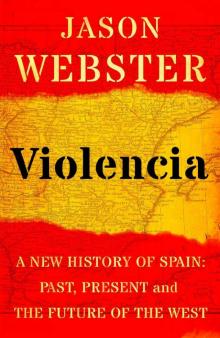 Violencia
Violencia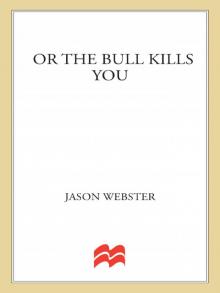 Or the Bull Kills You
Or the Bull Kills You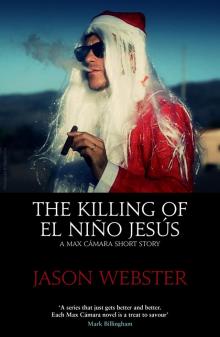 The Killing of El Niño Jesús
The Killing of El Niño Jesús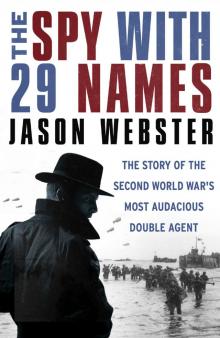 The Spy with 29 Names
The Spy with 29 Names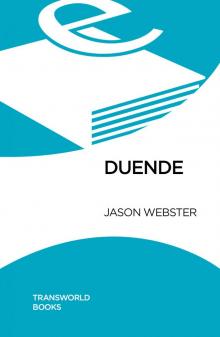 Duende
Duende Guerra
Guerra Sacred Sierra
Sacred Sierra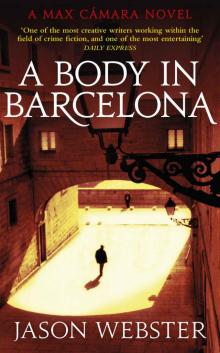 A Body in Barcelona: Max Cámara 5
A Body in Barcelona: Max Cámara 5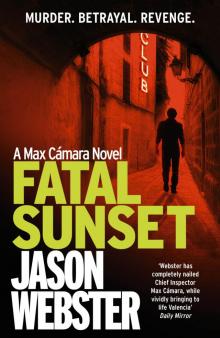 Fatal Sunset
Fatal Sunset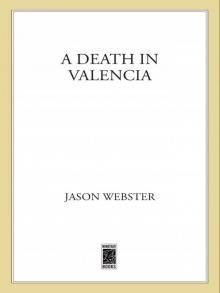 A Death in Valencia
A Death in Valencia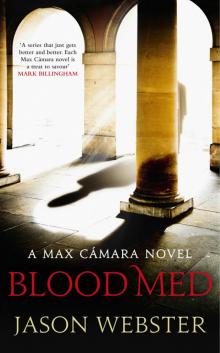 Blood Med
Blood Med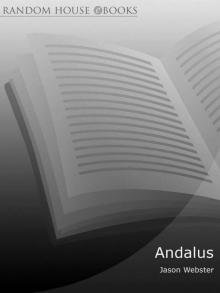 Andalus
Andalus